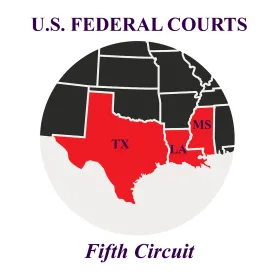The US Court of Appeals for the Federal Circuit ordered the transfer of a case asserting standalone Walker Process antitrust claims involving an unenforceable patent to the regional circuit, in this case the US Court of Appeals for the Fifth Circuit. Chandler v. Phoenix Services LLC, Case No. 20-1848 (Fed Cir. June 10, 2021) (Hughes, J.) The case originated in the US District Court for the Northern District of Texas, over which the Fifth Circuit has appellate jurisdiction. The decision to transfer was based on a subject matter jurisdiction analysis for Walker Process claims. The Federal Circuit reiterated that its precedent does not mandate exclusive Federal Circuit jurisdiction over all Walker Process cases.
In 2006, Phoenix Services and Mark Fisher (collectively, Phoenix) acquired a company called Heat On-The-Fly and its patent to protect a purported proprietary fracking process. Heat-On-The-Fly, and later Phoenix, sought to enforce the patent against numerous parties. During the patent application process, however, Heat On-The-Fly had failed to disclose numerous public uses of the fracking process prior to the application filing. In 2018, in an unrelated case, Energy Heating, LLC v. Heat On-The-Fly, the Federal Circuit, held that “failure to disclose prior uses of the fracking process rendered the . . . patent unenforceable due to inequitable conduct.” The plaintiffs in the case at hand, Ronald Chandler, Chandler MFG., Newco Enterprises and Supertherm Heating Services (collectively, Chandler), alleged that Phoenix’s continued enforcement of the patent violated Walker Process pursuant to § 2 of the Sherman Act.
Walker Process monopolization claims originate from a 1965 Supreme Court decision that recognized an antitrust cause of action under the Sherman and Clayton Acts when a party fraudulently obtains a patent for the purpose of attempted monopolization. Walker Process Equipment, Inc. v. Food Machinery & Chemical Corp. To succeed on a Walker Process claim, a plaintiff must satisfy two elements:
-
The plaintiff must show that the defendant obtained the patent through knowing and willful fraud on the US Patent & Trademark Office and enforced that patent with knowledge of its fraudulent procurement.
-
The plaintiff must be able to satisfy all other elements for a Sherman Act monopolization claim.
Pursuant to 28 U.S.C. § 1295(a)(1), the Federal Circuit retains jurisdiction over any civil case arising under any act of Congress relating to patents. In this instance, the Federal Circuit stated that Walker Process antitrust claims may relate to patents “in the colloquial use of the term,” but under 1988 Supreme Court precedent, Christianson v. Colt Indus., the Federal Circuit’s jurisdiction only extends to cases where the cause of action is created under federal patent law, or where the plaintiff’s right to relief “necessarily depends on resolution of a substantial question of federal patent law.”
Here, the Federal Circuit relied on its own 2018 precedent where it analyzed subject matter jurisdiction for Walker Process claims. Xitronix Corp v. KLA-Tencor Corp. (Xitronix I). Xitronix I involved alleged fraud by the defendants to obtain a patent. The Court acknowledged that patent law was applicable to adjudicating the case, but ultimately held that Walker Process claims do not present a substantial issue of patent law under Supreme Court precedent. Therefore, the Federal Circuit transferred the Xitronix I case to the Fifth Circuit.
In 2019, the Fifth Circuit, upon finding the Federal Circuit’s analysis “implausible” and that Federal Circuit precedent provided for jurisdiction over Walker Process claims, returned the case to the Federal Circuit. Xitronix II. The Federal Circuit agreed to hear the case because, in its view, the Fifth Circuit’s analysis was not “implausible,” and because a prior case implicitly found that whether a patent question is “substantial” turns on whether the patent in issue is “live” such that the resolution of the non-patent issue is not “merely hypothetical.” Xitronix III (citing the Supreme Court 2013 decision in Gunn v. Minton).
The Federal Circuit distinguished the present case from Xitronix because here the patent was deemed unenforceable in 2018—meaning there was no longer a “live” patent at issue. Therefore, the Federal Circuit explained the jurisdiction analysis in Xitronix III was inapplicable. Since the patent was previously held unenforceable, another court’s analysis of the Walker Process antitrust claims did not risk altering the validity of a “live” patent or declaring that a proceeding before the US Patent & Trademark office was tainted. The Court thus concluded that the Phoenix case invoked less of a justification for jurisdiction than Xitronix, and that the Court’s subject matter jurisdiction analysis in Xitronix I was controlling and necessitated a transfer to the Fifth Circuit.
Practice Note: The Federal Circuit decisions in Phoenix and Xitronix make clear that the Federal Circuit will not assert subject matter jurisdiction over a standalone Walker Process antitrust claim without, at the very least, a preliminary determination that the relevant patent is “live.”





 />i
/>i
